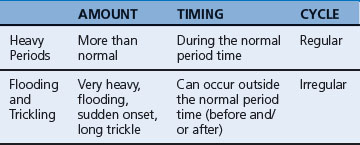CHAPTER 11 Heavy Periods
‘Heavy Periods’ means periods that occur regularly and last the customary 5 days or thereabouts but are heavier than normal. As mentioned in Chapter 2 on physiology, the average blood loss during a menstrual cycle is 30–80 ml. Since the range of blood loss is quite broad, the definition of a ‘heavy’ period can be rather subjective and difficult to gauge. Generally speaking, a period may be called ‘heavy’ if it starts with a gush of blood, catching the woman unaware and necessitating an urgent resort to a tampon or sanitary towel (pad), or if the woman has to make very frequent changes of these protective devices.
As a category of disease-symptom in Chinese medicine, Heavy Periods (called Yue Jing Guo Duo) should be differentiated from Flooding and Trickling (Beng Lou). The former consists of heavy bleeding which occurs at the proper time and within the proper span of the periods (approximately 5 days); the latter consists of very heavy bleeding that may both start before the proper time and continue after it, and may also trickle on for a long time after the period should have ended. The distinction between these two conditions is not too important in terms of pathology and treatment, which are essentially the same, but it matters from a prognostic perspective: in fact, Flooding and Trickling is more difficult to treat than Heavy Periods. Table 11.1 illustrates the main differences between Heavy Periods and Flooding and Trickling; see also Fig. S-4.1 (p. 198).
Aetiology
Identification of patterns and treatment
All the herbal prescriptions in this section are detailed in Appendix 1 on p. 937.
Qi deficiency
Herbal treatment
c Prescription
d Prescription
Explanation
This formula, by Fu Qing Zhu, is for chronic conditions of heavy bleeding from Qi deficiency resulting in Blood deficiency as well. Although it may seem strange that heavy bleeding occurs when Blood is deficient, Fu Qing Zhu explains this by saying that, no matter how deficient Blood is, if it does not return to the vessels properly, menstruation will be heavy.1




